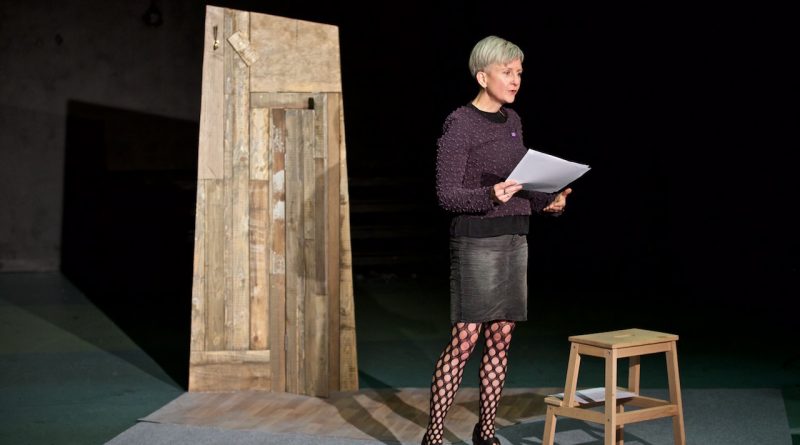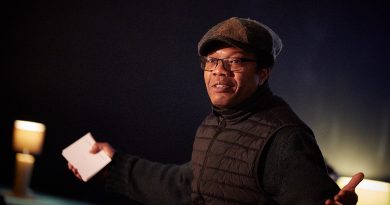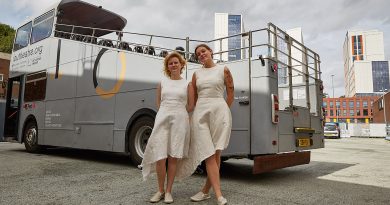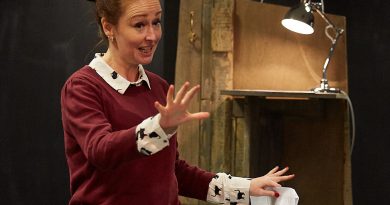Under the Carpet by Sarah Woods (Are We Where We Are? Shop Front Theatre, Coventry, 16 Nov 2017)
reviewed by Stella Backhouse
With the Festive Season fast approaching, writer/performer Sarah Woods’ new monologue Under the Carpet, and premièred by Shop Front Theatre Coventry as number four in its Are We Where We Are series, treated its audience to something not a million miles from a modern-day nativity.
The 1980s. Spitting distance from the front line in the Iran-Iraq war, a family of Kurds is awoken one night by hammering on the door. When they answer it, they find themselves confronted by enemy soldiers in search of shelter from the freezing weather. Woods recounts what happened next through the eyes of Kaveh, one of the children:
because they exist, we are suffering bombing, but we must open the door
Kaveh’s father puts wood on the fire and beds the soldiers down under carpets and blankets to keep them warm.
Fast forward thirty years. Fleeing a different war, the adult Kaveh arrives in Coventry seeking asylum. Introduced to Woods, who is conducting research for a project for BBC Radio, he tells her his story. But despite all the horrors Kaveh has witnessed in his life – like the bomb that exploded so close to his school that it melted his anorak – what was born the night the soldiers came was not hatred but hope.
“The soldiers, they are also human” Kaveh explained to Woods.
Parts one and three of Under the Carpet were devoted to Kaveh and his life in Kurdistan and Coventry. In part two, Woods spoke about her own experiences, including working as a volunteer at her local food bank. One of her duties is “packing bags according to a list given by the Trussell Trust” so that they can be passed to recipients who have:
handed over their human right to decide which breakfast cereal they will eat
Woods then used these insights as a springboard to a wide-ranging survey of many other injustices, both global and local: climate change, denials of human rights, the ubiquity of unwholesome food and the roll-out of Universal Credit all come under scrutiny. The inadequate responses and wilful obtuseness of political leaders (looking at you, Jacob Rees Mogg and your recent description of food banks as “uplifting”), prompted her to recall the image of sleeping soldiers from Kaveh’s early life. We have now put so much under our collective carpet, she said, “that we can no longer walk across it”.
The solution, Woods suggested, is better connection and understanding between people. She illustrated this by contrasting two of Kaveh’s memories. When he was a child, he recalled how his father always made him sleep with his shoes on in case the family needed to run from home at short notice. After he arrived in Coventry and was struggling to get by on his £36.95 a week asylum seekers’ allowance, it was an act of kindness by a stranger who noticed the poor state of his shoes and bought him a new pair, that helped him to start putting down roots. He concluded by telling Woods that:
I am you. You are me. We are not divided… I am a person who has hope
Woods is clearly a woman who thinks deeply and seriously about the state of the world and Under the Carpet touches on many of the issues that are closest to her heart. But while shedding light on what our leaders would prefer to keep hidden is always fascinating, the wisdom of lifting so many corners of the carpet at once is perhaps debatable; focus at times seemed to be sacrificed to panorama. Indeed, the sheer scale of the challenges the world is confronting left one audience member despairingly reaching for Goethe: “I thank God that I am not young in so thoroughly ruined a world”.
This did not seem to be the message Woods wanted us to take away. Without quoting Antonio Gramsci directly, she appeared to concur with him that we are currently in a period of struggle where “the old is dying and the new cannot be born; in this interregnum, a great variety of morbid symptoms appear”. It may also be a space where hope can flourish. “Looking at Kaveh’s story” she concluded, “there is no excuse for not having hope”.
Image by Andrew Moore





